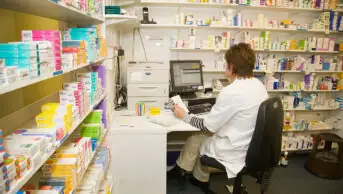
Wes Mountain/The Pharmaceutical Journal
In January 2024, Pharmacist Support — a wellbeing charity for pharmacists — launched a new course, ‘Embracing a workplace wellbeing culture’, specially designed for pharmacy managers, leaders and supervisors.
The course is aimed to empower professionals in the pharmacy sector with the knowledge and tools to foster a positive and supportive workplace culture.
It was developed off the back of a survey carried out by Pharmacist Support, in partnership with the Royal Pharmaceutical Society. The results of this showed persistent pressures in the pharmacy workforce that continue to negatively impact mental health and wellbeing.
The survey results revealed consistently very high levels of burnout, with around 50% of respondents citing a lack of work–life balance, lack of protected learning time and insufficient colleague or senior support as factors that have negatively impacted their mental health and wellbeing.
Meanwhile, according to mental health charity Mind, 56% of employers want to do more to improve staff wellbeing, but feel they do not have the right training or guidance.
In light of this, the ‘Embracing a workplace wellbeing culture’ course directly addresses the unique challenges faced by pharmacy managers and leaders in cultivating a healthy environment for their teams. Drawing on extensive research and industry insights, the course is aimed to offer practical strategies that can be implemented immediately, contributing to improved team wellbeing and performance.
The course also makes you think about creating a positive workplace — this is not about high performing teams but about how people feel
I was excited to start this course, as we have increased the number of employees in our organisation, and I wanted to ensure that we are doing everything we can to look after people’s wellbeing. We all work remotely and some of my colleagues predominantly work from home. It is important that, as a leader, I can recognise if there is a shift in someone’s wellbeing, which isn’t as easy when you don’t see people regularly face to face. I was hoping that this course would give me the tools to help and support the wellbeing of individuals in my team.
The course is divided into six modules that cover topics, including building resilience, communication tools, and workplace adjustments. I love that you get a workbook that you can download as I am trying to go paperless where I can (though I still have a notebook and added the modules to my “to do” list!).
The modules were easy to work through and it was possible to work through them in your own time. With life and work being so busy, it is often difficult to carve out time for self-development so being able to work on something at your own pace in bite-size pieces was very useful. The modules are a mix of quick videos and simple tasks to complete to check your understanding. The workbook activities give you a chance to reflect on what you have learnt and prompt you to think a bit more about what you have covered via the online modules. I found the workbook useful as it made you stop and reflect, something we do not often find time to do.
The modules cover some of the familiar tools used in leadership workshops/training, such as Maslow’s hierarchy of needs, which many participants will have come across before. However, what I found different about this course is that it also delves into understanding mental health better (and is not afraid to do so). Many traditional leadership training courses cover various theories and how to implement them. This course focuses on how to create a wellbeing culture in the workplace — with the current climate and pressures we are working under in all sectors of pharmacy, this is very much needed.
The course encourages you to think about your communication and leadership style. Some experienced leaders may have covered this before; I found it a good refresher. For newer leaders, it allows you to stop and reflect on your leadership style and how you can adapt it to support people struggling with their wellbeing in the workplace.
The course also makes you think about creating a positive workplace — this is not about high performing teams but about how people feel. By creating a positive workplace culture and allowing people to feel safe to voice their concerns, you will create a place where people want to work. This will improve retention and ultimately performance.
As an experienced leader who has worked in various community pharmacy environments and leading people who all have different needs, I found this course refreshing, easy to complete and thought provoking.
Further information on Pharmacist Support’s ‘Embracing a workplace wellbeing culture’ course and how to register can be found here.
Shilpa Shah is chief executive of North East London Local Pharmaceutical Committee


